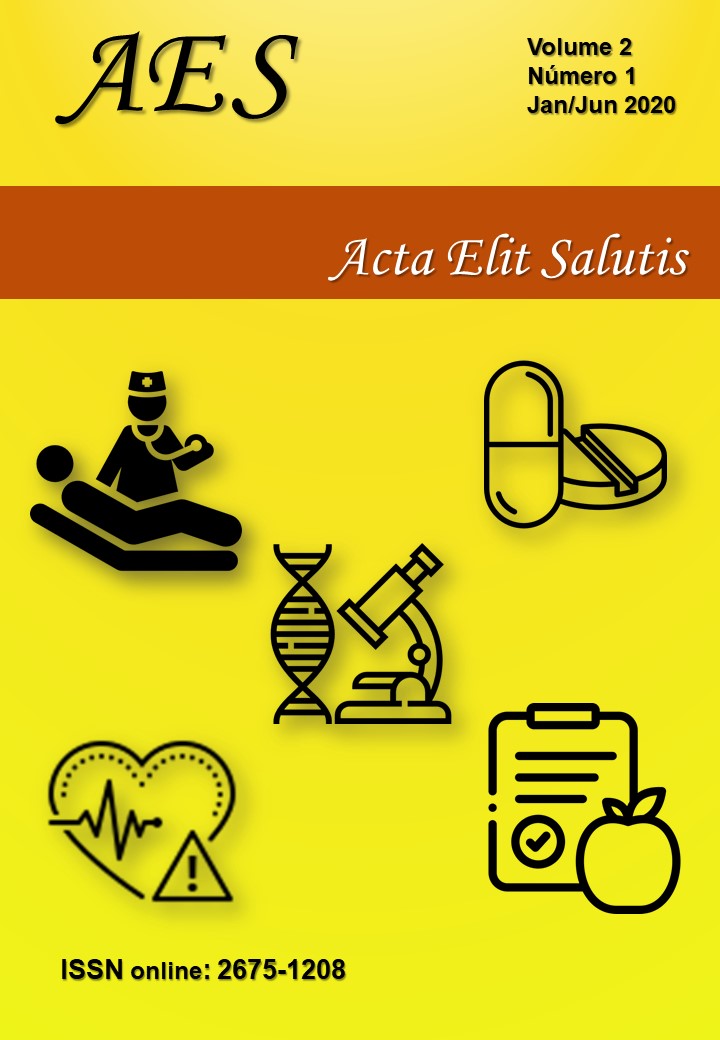Auriculotherapy as complementary treatment to physical therapy in the quality of life of the eldery with urinary incontinence
DOI:
https://doi.org/10.48075/aes.v2i1.24837Keywords:
Auriculotherapy;, Urinary Incontinence, Physical Therapy Specialty, Quality of Life, AgedAbstract
Urinary Incontinence is the involuntary loss of urine, which adversely affects people's quality of life, causing them discomfort to leave the home, depression, low self-esteem and even interferes with their psychological. With this, physiotherapy presents methods capable of promoting the decrease of urinary loss, interfering positively in the quality of life. Auriculotherapy is also an integrative practice, which, when applied correctly, improves this dysfunction. The present study aims to evaluate the effectiveness of auriculotherapy in the quality of life of the elderly with urinary incontinence (UI) as a complementary treatment to physical therapy. This is a descriptive and cross-sectional study carried out with three elderly individuals over 60 years. Two questionnaires, the King's Health Questionnaire (KHQ) translated and adapted to Portuguese, and the International Consutation on Incontinence Questionnaire - Short Form (ICIQ-SF) were used to evaluate the impact of UI on quality of life. As a treatment, physiotherapeutic exercises were performed in the three elderly patients, and two of them were applied auriculotherapy to help reduce urinary loss. Based on the questionnaires applied, the difference in the results from the beginning of care to the end of care did not have a significant difference. However, according to the patients' reports, they noted a decrease in urinary loss and also an increase in the time to control urine.
References
Camillato ES, Barra AA, Junior ALS. Incontinência urinária de esforço: fisioterapia versus tratamento cirúrgico. Feminina. Jul 2012. 40(4):187-94.
Sacomani ARS et al. Incontinência Urinária. In: Nardi AC et al, editors. Diretrizes Urologia – AMB. ed. São Paulo (BR): [s.n.], 2014. cap. 8, p. 82-90.
Mascarenhas T. Disfunções do pavimento pélvico: incontinência urinária e prolapso dos órgãos pélvicos. In: EDITORS.Manual de Ginecologia. Lisboa (PT): Permanyer; 2011. v.2. p. 283-98.
Jóji, E. Auriculoterapia oriental: método Enomoto. 1. ed. São Paulo: Ícone; 2005.
Fonseca ESM, Camargo ALM, Castro RA, Sartori MGF, Fonseca MCM, Lima, GR, et al. Validação do questionário de qualidade de vida (King’s Health Questionnaire) em mulheres brasileiras com incontinência urinária. Rev Bras Ginecol Obstet. 2005;27(5):235-42.
Tamanini JTN, Dambros M, D’Ancona CAL, Palma PCR, Júnior NRN. Validação para o português do “International Consultation on Incontinence Questionnaire – Short Form” (ICIQ-SF). Rev. Saúde Pública. 2004;38(3):428-44.
Downloads
Published
How to Cite
Issue
Section
License
Copyright (c) 2020 Acta Elit Salutis

This work is licensed under a Creative Commons Attribution-NonCommercial-ShareAlike 4.0 International License.
Aviso de Direito Autoral Creative Commons
Política para Periódicos de Acesso Livre
Autores que publicam nesta revista concordam com os seguintes termos:
1. Autores mantém os direitos autorais e concedem à revista o direito de primeira publicação, com o trabalho simultaneamente licenciado sob a Licença Creative Commons Attribution que permite o compartilhamento do trabalho com reconhecimento da autoria e publicação inicial nesta revista.2. Autores têm autorização para assumir contratos adicionais separadamente, para distribuição não-exclusiva da versão do trabalho publicada nesta revista (ex.: publicar em repositório institucional ou como capítulo de livro), com reconhecimento de autoria e publicação inicial nesta revista.
3. Autores têm permissão e são estimulados a publicar e distribuir seu trabalho online (ex.: em repositórios institucionais ou na sua página pessoal) a qualquer ponto antes ou durante o processo editorial, já que isso pode gerar alterações produtivas, bem como aumentar o impacto e a citação do trabalho publicado (Veja O Efeito do Acesso Livre).
Licença Creative Commons
Esta obra está licenciada com uma Licença Creative Commons Atribuição-NãoComercial-CompartilhaIgual 4.0 Internacional, o que permite compartilhar, copiar, distribuir, exibir, reproduzir, a totalidade ou partes desde que não tenha objetivo comercial e sejam citados os autores e a fonte.





